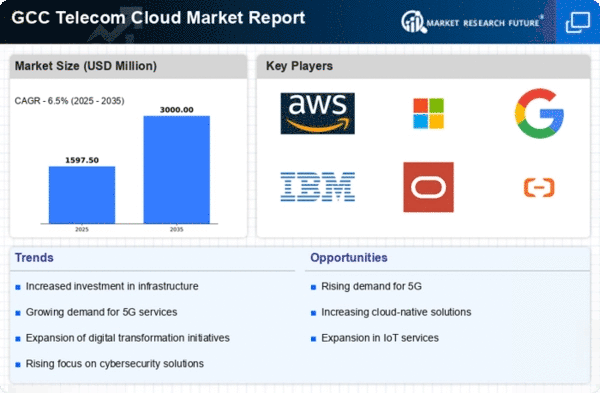Adoption of 5G Technology
The rollout of 5G technology is significantly influencing the telecom cloud market in the GCC. With its promise of ultra-fast data speeds and low latency, 5G is expected to enable a new wave of applications and services that rely heavily on cloud computing. Telecom operators are investing heavily in cloud infrastructure to support the demands of 5G networks, which could lead to a market growth rate of around 25% in the coming years. The integration of 5G with cloud services is likely to enhance the capabilities of IoT devices, smart cities, and autonomous systems, thereby expanding the scope of the telecom cloud market. As 5G adoption accelerates, the telecom cloud market is poised for substantial growth, driven by the need for advanced cloud solutions.
Increased Mobile Data Consumption
The telecom cloud market is being propelled by the exponential growth in mobile data consumption across the GCC. With the rise of smartphones and mobile applications, data traffic is projected to increase by over 30% annually. This surge necessitates robust cloud infrastructure to manage and store vast amounts of data efficiently. Telecom operators are increasingly investing in cloud solutions to enhance their service offerings and meet the growing demands of consumers. The ability to provide seamless connectivity and high-quality services is becoming a competitive advantage in the telecom cloud market. As mobile data consumption continues to rise, the need for scalable and flexible cloud solutions will likely drive further investments and innovations within the telecom cloud market.
Government Initiatives and Support
Government initiatives in the GCC are playing a pivotal role in shaping the telecom cloud market. Various national strategies aim to promote digital economies and enhance technological infrastructure. For instance, the UAE's Vision 2021 and Saudi Arabia's Vision 2030 emphasize the importance of cloud computing in achieving economic diversification and innovation. These initiatives are likely to lead to increased funding and support for telecom cloud projects, fostering a conducive environment for market growth. Furthermore, regulatory frameworks are being established to ensure compliance and security, which could enhance investor confidence in the telecom cloud market. As governments continue to prioritize technology-driven solutions, the telecom cloud market is expected to benefit significantly from these supportive measures.
Emergence of Innovative Business Models
The telecom cloud market is witnessing the emergence of innovative business models that are reshaping the industry landscape. Companies are increasingly exploring subscription-based and pay-as-you-go models, which offer flexibility and cost-effectiveness to customers. This shift is likely to attract a broader range of businesses to adopt cloud solutions, thereby expanding the telecom cloud market. Additionally, partnerships between telecom operators and cloud service providers are becoming more common, facilitating the development of tailored solutions that meet specific customer needs. As these innovative business models gain traction, they are expected to drive competition and enhance service offerings within the telecom cloud market, ultimately benefiting end-users.
Rising Demand for Digital Transformation
The telecom cloud market is experiencing a surge in demand driven by the ongoing digital transformation across various sectors in the GCC. Organizations are increasingly adopting cloud-based solutions to enhance operational efficiency and improve customer experiences. This shift is evidenced by a projected growth rate of approximately 20% annually in the telecom cloud market, as businesses seek to leverage advanced technologies such as artificial intelligence and big data analytics. The integration of these technologies into telecom services is expected to streamline processes and reduce costs, thereby attracting more investments into the telecom cloud market. As companies prioritize agility and scalability, the demand for cloud solutions is likely to continue its upward trajectory, further solidifying the telecom cloud market's position in the region.
















